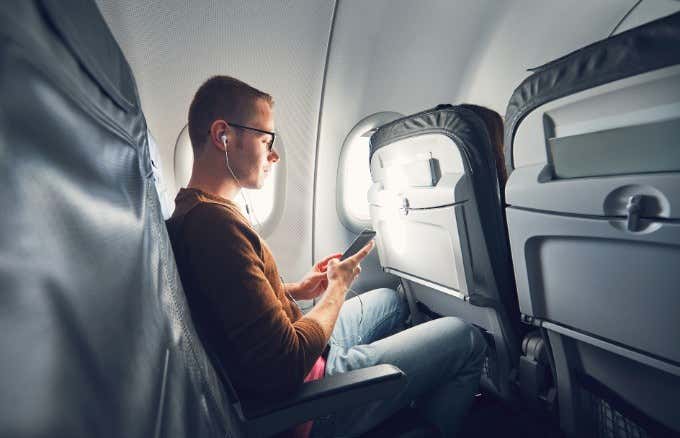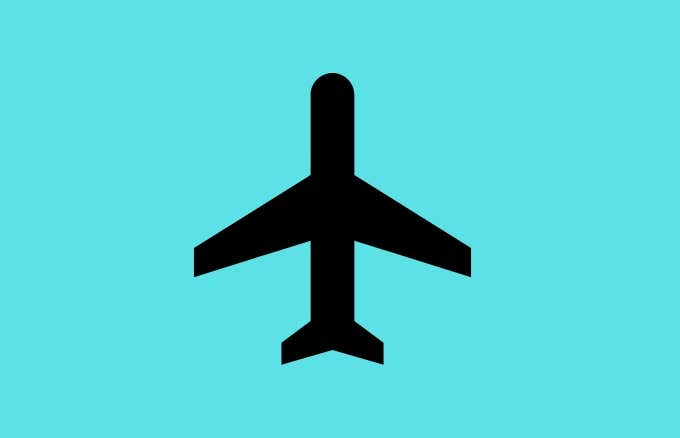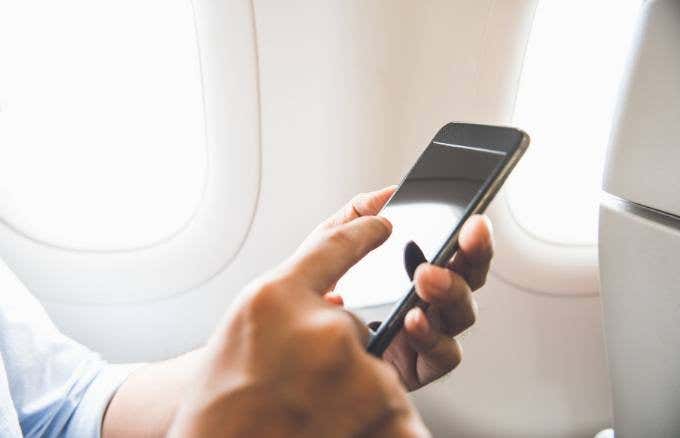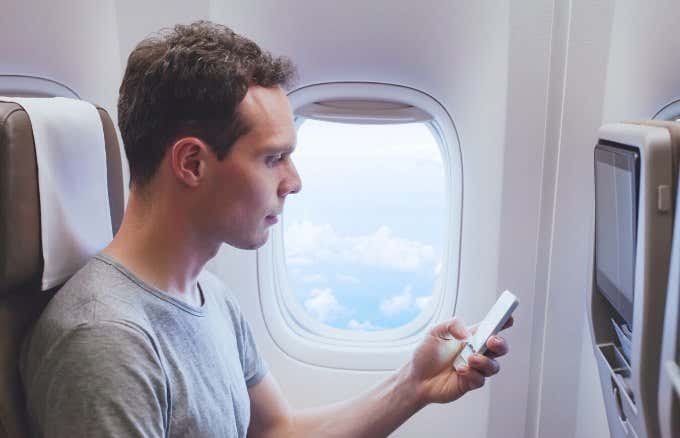So the flight attendant won't yell at you
If you’ve traveled by plane before, you’ve probably heard the warning about setting your portable electronic devices to airplane mode or game mode.
This is because most major airlines forbid the use of wireless communications while the plane is in the sky, as it could cause some interference that affects radios or other devices in the plane not to function properly.

This isn’t the only reason against using mobile devices in the airplane though. Sometimes using such devices can be distracting for other passengers on the same flight, because not everyone wants someone talking next to them or typing on their gadgets, especially if they’re trying to sleep.
In this guide, we’ll look at what is airplane mode, how it works, its usefulness, and whether it hinders your smartphone or tablet’s functionality when enabled.
What Is Airplane Mode?
Airplane mode, also known as flight or offline mode, is a feature on your smartphone or tablet, which prevents it from receiving or sending calls and text messages, and wireless data.
It’s mostly used while on an airplane as a safety precaution when taking off and landing, to disable the device’s ability to receive or send wireless data that can interfere with the plane’s radio communication and related systems.
Airplane mode is also found on laptops and computers, and when activated, it disables Bluetooth, WiFi and other telephone communications, making it easy to suspend radio-frequency transmissions.

It’s also useful when you want your phone or tablet to charge faster, or save on battery life by preventing your device from looking for signal connections thereby saving energy.
If you’re having problems with your mobile internet or finding a WiFi signal, airplane mode can help you regain carrier settings. You can do this by switching it on and off again in the same way you would when restarting your phone or tablet.
Other uses for Airplane mode include helping you focus on the task at hand by disabling constant notifications from games, social media, or texts and other apps. Plus, it also saves you cash, especially if you leave your gadget with kids who tend to download or purchase stuff, most times by mistake.
What Airplane Mode Does To a Smartphone Or Tablet
Airplane mode disables your phone or tablet’s wireless functions including the cellular connection, Bluetooth, GPS and WiFi, disconnecting you from all of them so they won’t work properly.
For low-battery situations, airplane mode comes in handy as it helps you save on the little battery you have left, though you can also use your device’s Low Power Mode instead, as that still lets you use your wireless connections.
However, the functions affected when airplane mode is enabled vary from one device to another.

On iPhones, for instance, airplane disables cellular voice and data, Bluetooth, WiFi, GPS, and location-based services. GPS is different though, because it doesn’t transmit radio frequencies, but whether or not airplane mode disables GPS will depend on your phone or tablet. Some features like live traffic won’t work in flight mode, even though offline maps may work without WiFi or cellular connections.
If you’re traveling by plane, and you’ve enabled airplane mode, you can still turn WiFi back on so as to use the in-flight WiFi connection, unless the airline’s rules require that all devices be turned off completely.
You can also use the camera, play games or listen to music and a few other functions on your phone or tablet.
How Airplane Mode Works
Airplane mode disables your phone or tablet’s data transmitters and receivers so there’s no data coming to your device or going out of it. You also won’t be able to receive or make any calls and texts, or get notifications that you’d normally get when flight mode is off.
When your smartphone or tablet is in airplane mode, it doesn’t need many resources to function. It’ll stop searching for signals from nearby cellular towers, Bluetooth devices, and WiFi hotspots too, thus conserving the battery life.

However, it also means you’ll be harder to locate because your phone or tablet isn’t transmitting its location or existence for that matter.
The idea behind airlines’ restrictions to using mobile devices in-flight isn’t because they don’t want you to. It’s mainly about the radio frequencies admitted by such devices that can interfere with the plane’s communication and navigation systems, sometimes even its collision avoidance system.
This is why the Federal Communications Commission (FCC) put rules to limit cellphone transmissions on airplanes, which in turn led to the prohibition of their use during takeoff and landing.
The FCC also believes that lots of cellphones aboard the plane may ping multiple cell towers at the same time, which can also confuse the phone network.
What Works While Airplane Mode Is Enabled
Most apps or services that require cellular or WiFi connections won’t work. These include email, social media, online games, weather and stock updates, voice assistants like Siri, app stores, or even stream music and videos from providers like Netflix, Spotify and the rest that need the internet to connect.

However, you can still check your notes, and your alarms and reminders will work as they don’t rely on an internet connection to work.
You can’t use emergency numbers too as all calls and texts are disabled so you can’t receive or send texts, neither can you make or receive calls.
Otherwise, you can listen to music from your phone or tablet, provided it doesn’t require a wireless connection, and you can take selfies and groupfies while you’re at it as your camera won’t be affected.
Summary
It’s possible to use WiFi on Airplane mode, depending on the device you have, by enabling it manually. There are airlines today that offer in-flight WiFi, so you need not get stuck trying to figure out how to send that email to your client, or deliver pending work when you can finish in-flight.
Check with the flight attendants first before you try to connect, and make sure you keep it turned off at takeoff and when the plane is landing.





